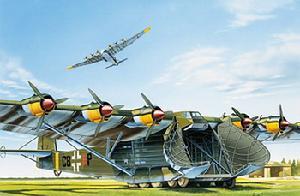Another large aircraft—the four-engine bomber he-177—also came. This large aircraft, designed according to Goering's special dive-bombing requirements, was rather unreliable in performance, and thus had a bad reputation as an "aerial lighter". Despite this, the luftwaffe, which was in a hurry, pulled in 40 He-177s, but fewer than 7 of them could be moved. In air freight, the He-177 is still a terrible aircraft. Although it was a four-engine aircraft, it was not much more loaded than the twin-engine he-111, and there was no place for the wounded. In all 20 of its airlift flights, although they were not intercepted by Soviet fighters, at least 5-7 of them caught fire and fell on their own.

Various airlift efforts have been somewhat effective. In the first 10 days of 1943, Paulus received a total of 1,093 tons of supplies, including 62 tons of ammunition, 202 tons of fuel, 815 tons of food, and 14 tons of other supplies. Apparently, before the Soviets launched their final general offensive, Paulus was focusing on food to fill his stomach rather than weapons and ammunition. But even with so much food being shipped in, the bread ration was reduced. The new standards for January 9 are:
75 grams of bread, 24 grams of vegetables, 200 grams of horse meat, 12 grams of butter, 9 grams of wine, 1 cigarette
Zeitzler, chief of the German Army General Staff, declared that he would share the hardships with the officers and men in the encirclement. His standard rations in mid-January 1943 were also 73 grams of bread, 200 grams of meat, 12 grams of butter, 11 grams of sugar, and 1 cigarette. Speer alluded to Zeitzler for "eye-catching", and Hitler was not interested in the trick and ordered Zeitzler to resume normal eating immediately.
Paulus's army group now lived almost entirely on horse meat. The Soviets estimated that by January 10, the Germans would have eaten up their horses, leaving only the scraped bones. The Soviets were a little more optimistic. Hube told Hitler that meat would last until the end of January. Paulus also claimed that by mid-January, he would be able to "distribute effective supplies in a relatively orderly manner."